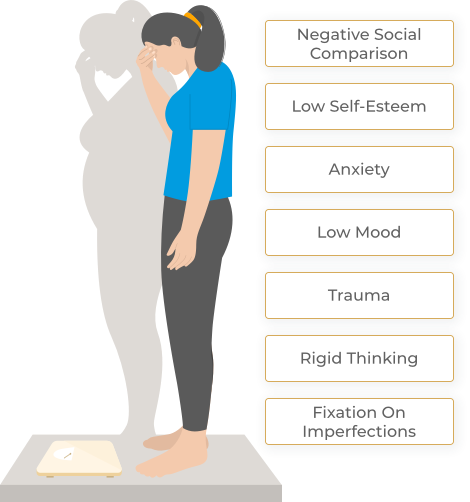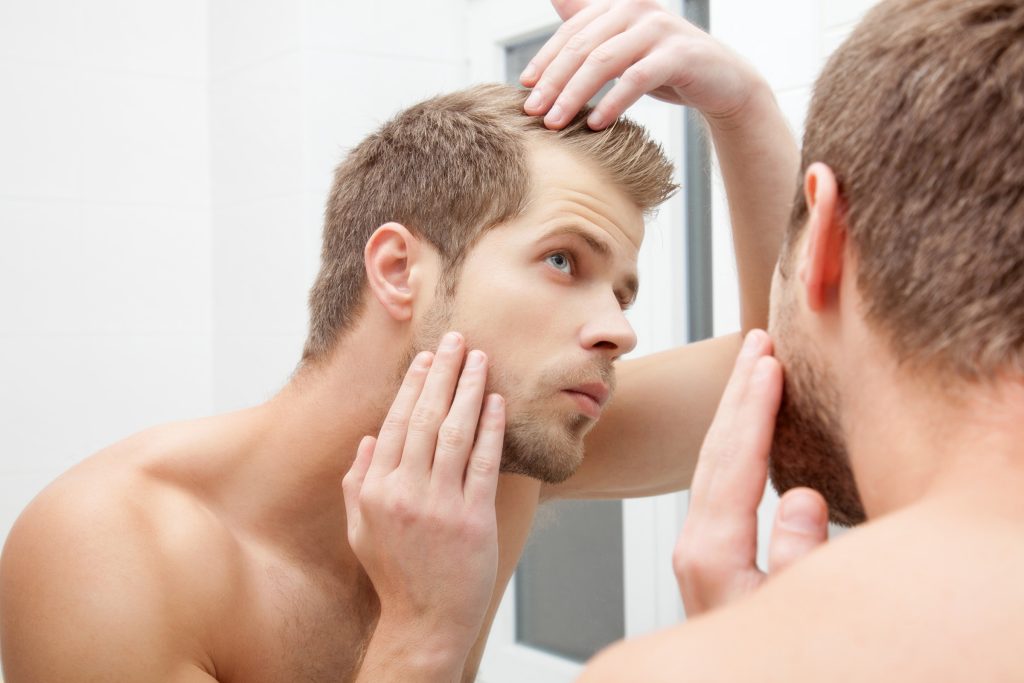Healing Body Image
- Compassionate, Personalised Care: We offer Tailored Treatment Plans Designed To Meet Your Unique Body Image Needs
- Expert Psychological Support: We Specialize in Evidence-Based Therapies to Effectively Address Body Image Issues & Body Dysmorphia
- Targeted Interventions: Transform the Perception of Your Body & Build Greater Self-Acceptance On
HEALING BODY IMAGE ISSUES
Reclaim Your Self-Worth: Develop Body Confidence & Acceptance
Are you struggling with feelings of shame and embarrassment when you look in the mirror? Do you sometimes negatively fixate on certain parts of your body? Are you stuck seeing your body as bigger, even when you have lost weight?
Many people wrestle with similar feelings of being trapped by negative thoughts about their bodies, often leading to anxiety and emotional distress. Our experienced team provides body image therapy to help you break free and rediscover your self worth.

Improved Self-Esteem
Learn to see yourself beyond physical appearance and build confidence in who you are.

Healthier Relationship With Food
Break free from the cycle of yo-yo dieting and develop a more balanced approach to nutrition.

Enhanced Intimacy
Discover ways to improve your intimate relationships by developing a positive self-image.

Increased Self-Compassion
Develop greater kindness and understanding towards yourself to promote emotional well-being.
Through our compassionate and professional approach, we offer support tailored to your needs, focusing on healing the underlying issues that contribute to a negative body image.
Take the first step toward transforming your body image and reclaiming control over your life and happiness today.
TAKE CONTROL OF YOUR HEALTH TODAY – WE ARE HERE TO HELP
Struggling with weight and eating challenges? You don’t have to face it alone.
Our compassionate team is ready to listen, support, and guide you toward a healthier, happier life.
Book your free call now and take the first step.
OUR FEES
Our initial consultation is free of charge, with health coaching sessions starting from £90, therapy sessions at £120, and nutrition consultations from £200.
Health packages and multi-session bundles available – we’ll guide you to the most suitable option when we speak.
Mark – Do You Resonate With His Story?
Mark, a 42-year-old married man, has been grappling with negative body image issues that have deeply affected his life. He frequently experiences feelings of inadequacy and self-loathing, perceiving himself as fat, unattractive, and worthless.
These feelings often lead to a cycle of yo-yo dieting, where Mark fluctuates between trying to lose weight and then gaining it back, which exacerbates his dissatisfaction with his appearance.
This constant internal battle with his body image has strained his marital relationship, particularly affecting his ability to connect with his wife on an intimate level. As a father, Mark worries that his anxieties and negative self-perceptions might inadvertently be passed down to his young children.
Realizing that his body image issues are impacting multiple facets of his life, Mark is now seeking therapy to free himself from this psychological trap. He acknowledges that his struggles have a significant emotional toll every day, as well as affecting his self-esteem, his role as a husband, and his fears around fatherhood.
Through therapy, Mark hopes to cultivate self-compassion and develop a healthier perspective on his body. His goal is to break the chain of negative beliefs dogging him for years, reassuring himself of his worth beyond physical appearance.
By working with a therapist, Mark aims to transform his internal dialogue, fostering a sense of acceptance and gradually build the confidence to reconnect with his family and live a happier, more balanced life.
Factors That Influence Body Image
Body image can be influenced by both internal and external psychological experiences that happen over time. Below you can find out more about different factors and how they may affect your perception of yourself.
Social Comparison
Social comparison is an important factor that influences the development of our body image.
We may feel social pressures to meet societal beauty standards, and end up negatively comparing ourselves to people we feel meet this standard.
When we repeatedly compare ourselves to others, we can trigger a critical inner dialogue of judgement towards ourselves.
We may feel that we are not good enough because we cannot look a particular way, and this affects our self-worth, often driving certain behaviours to either avoid a situation or to cover up our perceived imperfections.
Social Media
Social media often drives and encourages negative social comparison.
Social media is largely image-based, and we may find ourselves constantly viewing images of bodies that meet societal beauty ideals. We may begin to view our worth in terms of ‘likes’, and become hypercritical of our perceived flaws.
Social media users often choose to show off their best selves and often appear very happy. We may begin to associate this ‘happiness’ with meeting beauty and body shape standards, and this can make us struggle with difficult negative emotions, such as guilt, anxiety and low mood.
Body Image & Health Issues
Having a change in health status or developing illness can affect our body image.
When our body undergoes physical changes, our perception of our body may also change. We may begin to fixate on physical changes, such as scars and burns, and this can cause us to feel insecure and self-conscious.
As body image is a perception, this may be distorted and may not represent reality. We may struggle to recognise and identify with our bodies after surgery or treatment.
We may struggle with our body image after losing or gaining weight. We may find ourselves uncomfortable within ourselves as we become more aware of these changes.
Consequences Of Poor Body Image
Having poor body image can lead to serious negative consequences for your psychological and physical well-being.
Our thinking patterns can become hijacked and we may begin to notice exaggerated or imagined flaws in our physical appearance. This is called Body Dysmorphic Disorder, where we may find ourselves constantly checking for flaws, and finding it hard to shut out negative thoughts about our bodies.
We may also develop disordered eating behaviours, in an attempt to reach our idealised body shape ideal. In extreme cases this can trigger Anorexia Nervosa, where there is an intense desire to lose weight by restricting food and overexercising.
Poor body image and eating distress can lead us to isolate ourselves from our friends and families, because we fear others will judge our appearance. Our quality of life shrinks, and our preoccupation with our body can intensify.
There may also be negative consequences for your physical health. Cutting out food groups may result in an unbalanced diet and deficiencies in key minerals and vitamins.
Malnutrition can cause our bodies to crave certain foods for energy. In addition to psychological symptoms, nutritional deficiencies can lead us to feel exhausted, dizzy and unable to concentrate. In serious cases, malnutrition can cause us to develop fragile bones, hair loss and more.

MEET NICKI & HEAR Her STORY
Nicki shares how working with WeightMatters has transformed her life.
Body Dysmorphic Disorder
Many people feel unhappy or insecure about their physical appearance at some point in their lives. However, some individuals become obsessed and excessively worried about a small, and often exaggerated or imagined, flaw in their physical appearance.
The condition is known as Body Dysmorphic Disorder (BDD), or body dysmorphia. People with BDD also engage in compulsive actions, such as excessively using mirrors to check their appearance or over-exercising to cope with the stress they feel about their physical image.
The severity of body dysmorphia differs from individual to individual, as well as, on a day to day basis. In many cases, it can lead to reduced self-esteem, feelings of anxiety and depression, and negative impact on social relationships. However, in extreme cases, people may also experience social phobia, withdrawal and/or self-harm.
Common Symptoms Of Body Dysmorphic Disorder
Here are some of the symptoms and behaviours you may notice with body dysmorphic disorder.
- Perfectionism (undergoing cosmetic surgery and behaviours such as excessive moisturizing and exercising with an aim to create an unattainable but ideal body to reduce anxiety)
- Obsessive thoughts about perceived appearance defects
- Obsessive and compulsive behaviors related to perceived appearance defects
- Major depressive disorder symptoms
- Delusional thoughts and beliefs related to perceived appearance defects
- Social and family withdrawal, social phobia, loneliness and self-imposed social isolation
- Anxiety, and possible panic attacks
- Chronic low self-esteem
- Feeling self-conscious in social environments, thinking that others notice and mock their perceived defects
- Strong feelings of shame
- Problems initiating and maintaining relationships (both intimate relationships and friendships)
- Repetitive behavior such as constantly applying make-up or regularly checking appearance in mirrors
What Factors Can Lead To Body Dysmorphic Disorder Development
There are a range of psychological factors that can influence the development of body dysmorphia. Life events, mental health and social media can all play a part in how body dysmorphia is then maintained.
Physical Changes & Injury
Physical changes or injury can trigger poor body image and lead to body dysmorphia.
When our body undergoes physical changes, this can affect our self-perception and trigger unhelpful and distressing thoughts and feelings. We may begin to fixate on injuries such as scars and burns, and this can cause us to feel insecure and self-conscious.
We may struggle with body dysmorphia after weight changes. We may become hyper aware of weight gain or loss, and start checking our bodies for flaws and imperfections.
This may trigger restrictive eating disorders, compulsive overexercising or even in a condition in men called bigorexia.
Critical Inner Voice
Having a critical inner voice can maintain body dysmorphia and worsen your symptoms. This voice might tell you that you are fat and disgusting, or that people are staring at your flaws when you are in public.
An unchecked critical inner voice can grow louder and become more powerful, contributing to anxiety, depression and low self-esteem. It might also stop you from seeking support and cause you to isolate yourself from others.
You might feel driven to action behaviours in an attempt to quieten your critical inner voice and reduce your anxiety. This may include excessively exercising or undergoing cosmetic surgery to change your appearance and minimise your perceived flaws.
As perfectionism is a component of body dysmorphia, your inner critic may judge that what you have done is not good enough, and will search for another flaw to fixate on.

BODY IMAGE TREATMENT
At WeightMatters, we understand that struggling with body image issues and body dysmorphia can be an isolating and challenging experience. Rigid negative thinking and a skewed self-perception can leave you feeling trapped and hopeless.
We provide a safe and supportive environment, and empower our clients to explore the roots of their body image concerns and develop healthier perceptions of their bodies.
Let us partner with you in this transformative process, so you can find body image acceptance and build a resilient self worth.
It’s Time To Heal.
Therapy
We have an experienced therapy team at WeightMatters who specialise in treating body image issues and body dysmorphia. Here are some of the disciplines and interventions they may use:
Cognitive-Behavioral Therapy (CBT) – CBT helps you identify and challenge distorted beliefs and negative thought patterns related to your body image. By restructuring these thoughts, you can develop a healthier self-perception and reduce body dissatisfaction.
Mindfulness & Self-Compassion – These techniques encourage you to cultivate awareness of your thoughts and feelings without judgment, fostering a kinder relationship with yourself. Practices such as meditation and deep breathing can enhance body acceptance and self-compassion.
Exposure Therapy – This technique gradually exposes you to situations or stimuli that elicit body image distress, helping you reduce avoidance behaviors and anxiety. By confronting fears in a controlled environment, you can desensitize your reactions and build resilience.
Acceptance & Commitment Therapy (ACT) – ACT encourages you to accept your thoughts and feelings about your body while committing to actions that align with your values. This approach emphasizes acceptance of oneself as a whole, rather than focusing solely on appearance.
Narrative Therapy – By exploring and reshaping the stories clients tell about themselves and their bodies, narrative therapy can help you separate your identity from negative body image experiences. This approach empowers you to author new, more positive narratives about your worth and identity.
Dialectical Behavioral Therapy (DBT) – Originally designed for emotional regulation, DBT can help clients manage intense emotions related to body image. It focuses on building skills like mindfulness, distress tolerance, and emotional regulation to support a balanced approach to body image concerns.
IT’S TIME TO START YOUR HEALING JOURNEY
You can discover our clear pricing structure.
SERVICES WE RECOMMEND FOR BODY IMAGE TREATMENT
Here are the WeightMatters services we recommend for body image and body dysmorphia treatment.
IF IT FEELS MORE COMFORTABLE, EMAIL US
Do you have a question about our treatment and support?
Leave your details below, and we will come back to you with a personalised response.
